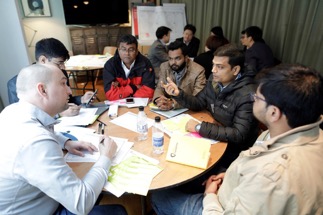19th June 2018 New Delhi, India
Engineering Innovation thrives on the ‘Living Bridge’

At its essence engineering is about making ‘things’ that work and making ‘things’ work better. From farming to sanitation and healthcare to infrastructure, engineering has led to advances in technology which have saved and improved the lives of – and unlocked opportunities for – billions of people around the world. However, such breakthroughs don’t happen by chance. They come from the right people engaging with societal problems in the right way. At the Royal Academy of Engineering, we’ve been incredibly lucky to have supported hundreds of talented people and novel partnerships which do just that.
Nothing typifies these efforts more than our work with India and it’s been a busy few months for us with the Newton-Bhabha Fund! In February, we welcomed 15 Indian technology entrepreneurs to London through our Leaders in Innovation Fellowships (LIF) programme. LIF builds the business skills of engineers who have innovated low cost, heavily scalable and remarkably profitable solutions that directly tackle social and environmental problems. Anant Raheja, for instance, is a materials engineer who invented Fib-Sol, a product which replaces the currently used bulky 25kg bags of toxic chemical fertiliser with a pocket-sized 25g pouch of water-soluble, environmentally friendly fertiliser which improves farm yield by 25% comparatively.
Anant and his cohort join an innovators network of 52 Indian engineers and over 700 more ‘LIFers’ from Newton Fund countries globally. Collectively they have raised over $50 million funding for their technology-based social enterprises, with many created from scratch at the London training! LIF is modelled on the Academy’s successful Enterprise Hub which trains, coaches and mentors the UK’s brightest engineering researchers to bring their breakthrough innovations from academia into the marketplace.
March saw the Academy award 8 grants from a fiercely competitive application round of our Industry-Academia Partnership Programme (IAPP). India faces a shortage in the quality of its engineers with only a reported 20% of graduates deemed by the industry as employable. This is hugely problematic for a government whose growth strategies rely heavily on these skills to support ambitious infrastructure projects and develop advanced manufacturing, digital and renewable energy industries to create more jobs for a booming young population of 600 million.
By supporting partnerships between Indian industry, Tier 2/ Tier 3 Indian universities and UK counterparts, the IAPP helps leverage UK expertise to better equip engineers for the job market whilst also encouraging world-leading research into solutions for real problems faced in India. One of the projects supported in this round is an ambitious collaboration between UCL, Brunel University and a coalition of Indian academic and business counterparts (including Amazon!) to address the growing demand for Artificial Intelligence engineers in India. They join 26 projects funded in previous years in topics ranging from solar energy, industrial sustainability and smart infrastructure.
And finally, in April, the Academy co-hosted a policy symposium with the Indian Department of Science and Technology’s Centre for Policy Research in Chandigarh. Titled ‘Working in Systems not Siloes‘ the event shared the Academy’s latest thinking with senior stakeholders across India on the right incentives and framework for research policy to create cross-sector collaborations and innovation eco-systems. Recommendations from the event are now being drafted and will be fed directly to the Indian Government’s chief planning body, NITI Ayog for their consideration. Whilst in India, The Academy was also invited into the Ministry of Electronics and IT in Delhi to conduct a technical session where we also shared our latest policy insights on Cyber Security and the Internet of Things. These are fields where the UK has world-leading capabilities but requires global cooperation to ensure safety and resilience as we connect more devices into increasingly complex digital networks with growing vulnerabilities.
As our work through the Newton and Global Challenges Research Funds has shown, if shaped well and targeted smartly then small amounts of investment in engineering capacity can create big impacts. Be it tackling global challenges or taking advantage of global opportunities, the UK’s engineering sector has much to offer and we look forward to working even more with international partners in shaping the agenda, developing knowledge and helping share expertise in the places where it’s most needed and wanted. With technology accelerating at ever-faster rates, we truly feel that the opportunities are becoming so vast, and the potential almost boundless, for the UK to continue leading the way in Engineering a Better World.
